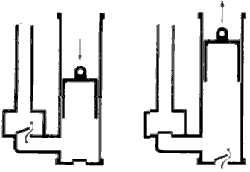Ctesibius
Ctesibius (fl. 2nd century B.C.), a Greek Alexandrian, was described as a mechanical genius whose inventiveness was limited only by the restrictions of the world he lived in. He was the son of a barber but the highly technical environment of Alexandria of this time helped him to leave the barbershop soon.
 Using the power of water and air, he devised a number of ingenious mechanisms: a water organ, whose air pipes were operated by the weight of falling water, an air-powered catapult and a force pump.
Using the power of water and air, he devised a number of ingenious mechanisms: a water organ, whose air pipes were operated by the weight of falling water, an air-powered catapult and a force pump.
Another useful invention was a portable double water pump used by the firemen to put off the fires on the big buildings of his city.
Ctesibius is perhaps best remembered for the CLEPSYDRA, or water clock. Although he did not actually invent it, he greatly improved it.

Ctesibius liked music and had an idea of using waterpower for his music creations. He made the first 'armonion'. This was pumping air through pipes!
Talking about musical instruments, it would be an omission to not mention Pythagoras. He meditated the relation of the music to the mathematics and found some rules that make the making of musical instruments much easier. He managed to express the musical harmony with mathematic rules through his philosophical and scientific approach.
The piston pub was also used by Ctesibius to pump water or air. He used it mainly for his prototype 'armonion' but also to other machines. These pubs were used in many constructions since then. They can pump water or air depending on the accuracy of the construction. In many applications we can find them in use until today, because of their simplicity and their reliability.
 Using the power of water and air, he devised a number of ingenious mechanisms: a water organ, whose air pipes were operated by the weight of falling water, an air-powered catapult and a force pump.
Using the power of water and air, he devised a number of ingenious mechanisms: a water organ, whose air pipes were operated by the weight of falling water, an air-powered catapult and a force pump.
